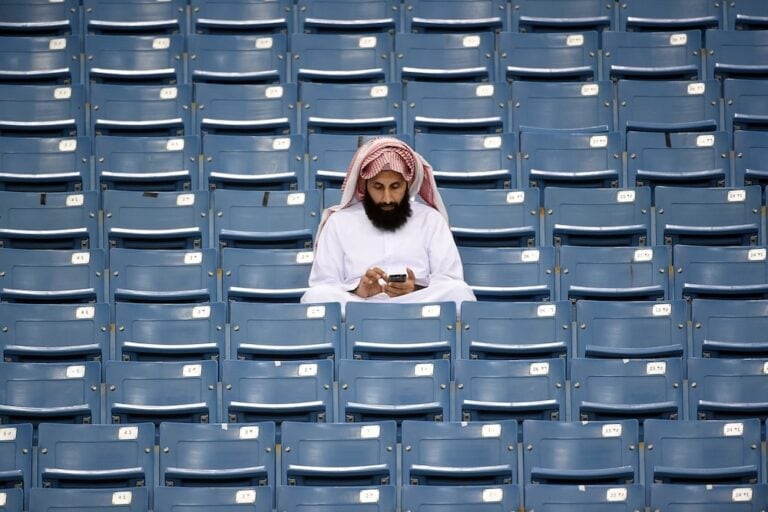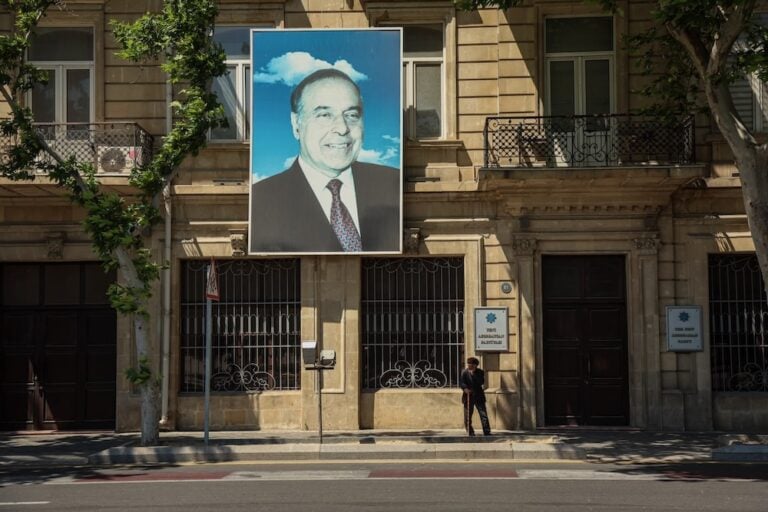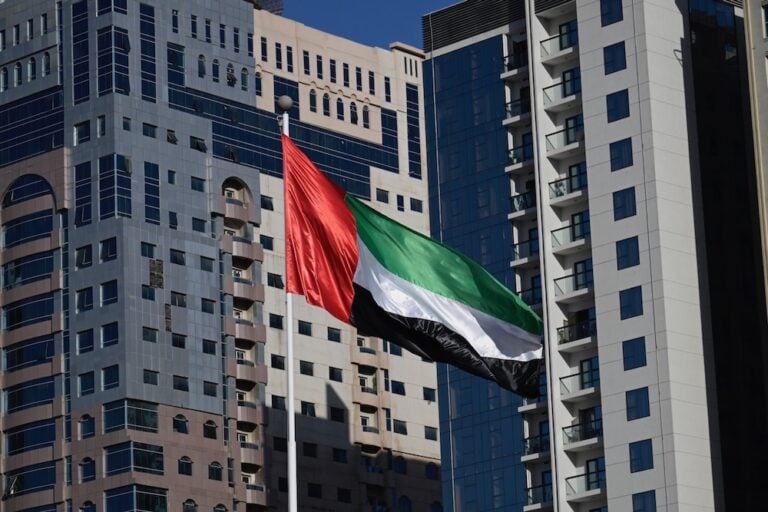The mass “UAE 94” trial imprisoned dozens of government critics and reform activists in the United Arab Emirates.
On the second anniversary of the start of the mass “UAE 94” trial that imprisoned dozens of government critics and reform activists in the United Arab Emirates (UAE), including prominent human rights defenders, judges, academics, and student leaders, a coalition of 13 organizations calls on the UAE government to release immediately and unconditionally all those imprisoned solely for peacefully exercising their rights to freedom of expression and association following this grossly unfair trial, as well as those who remain detained or imprisoned for publicizing concerns about it.
The organizations also call on the authorities to ensure that the allegations of torture and other ill-treatment that the individuals were subjected to prior to and following their trial are promptly, independently, impartially and thoroughly investigated, that those responsible are held to account, and that the victims have access to effective remedies and to reparation.
The organizations share the serious concerns raised since 2011 by several UN human rights bodies and human rights organizations regarding the UAE government’s continuing pattern of harassment, secret, arbitrary and prolonged incommunicado detention, torture and other ill-treatment, enforced disappearances, and unfair trials targeting activists and those critical of the authorities, as well as its increasing use of national security as a pretext to clamp down on peaceful activism and to stifle calls for reform.
The space for dissent in the UAE is increasingly shrinking. The repression has been entrenched with the enactment in 2012 of the cybercrimes law, which the government has used to silence social media activists and others who support and defend freedom of expression online, and the enactment of the 2014 counter-terror law.
The vague and overly broad definition of terrorism in the 2014 law, which treats a wide range of activities, including those protected by human rights standards, as amounting to terrorism, may be used to sentence human rights defenders or critics of the government to lengthy prison terms or even death.
The organizations call on the UAE government, which currently is a member of the UN Human Rights Council, to adhere to its obligations to uphold human rights at home, including respecting the rights to freedom of opinion and expression, and to freedom of association and peaceful assembly. The anniversary of the mass trial, widely known as the “UAE 94” trial, coincides with the anniversary of the March 2011 petition from a group of 133 high-profile women and men addressed to the UAE President, which called for democratic reform.
The petition elicited an uncompromisingly repressive response from the UAE authorities and many of its signatories, and their families, have been harassed, arbitrarily arrested, or imprisoned in the four years since they put their names to their call for reform.
The UAE 94 trial, which began on 4 March 2013 before the State Security Chamber of the Federal Supreme Court in Abu Dhabi, saw a total of 94 defendants, including eight who were charged and tried in absentia, stand trial en masse on the charge of establishing an organization that aimed to overthrow the government, a charge which they all denied. The trial failed to meet international fair trial standards and was widely condemned by human rights organizations and UN bodies, including the UN Working Group on Arbitrary Detention.
The court accepted prosecution evidence that consisted largely of “confessions” made by defendants while they were in pre-trial detention. The court failed to require, before the admission of such evidence, that the prosecution prove beyond reasonable doubt that the “confessions” were obtained by lawful means and voluntarily from the accused.
The court also failed to take steps to investigate, or order a prompt, independent, impartial and thorough investigation of the defendants’ claims that State Security interrogators had forced them, under torture or other ill-treatment, to make false “confessions” incriminating themselves and others during months when they were held incommunicado in secret locations and without access to lawyers or the outside world. The defendants were also denied a right of appeal to a higher tribunal; under UAE law, Federal Supreme Court judgments are final and not subject to appeal.
On 2 July 2013, the court convicted 69 of the 94 defendants, including the eight tried in absentia, and acquitted 25. The defendants included many people who had achieved prominence in the UAE in their respective fields in the law, education and academia, business, and as government advisers.
The court sentenced to prison terms of between seven and 15 years many well-known figures including: prominent human rights lawyer and law professor Dr Mohammed Al-Roken, who has written a number of books and journal articles on human rights, freedom of expression, and counterterror laws; high profile lawyers Dr Mohammed Al-Mansoori and Salem Al-Shehhi; judge Mohammed Saeed Al-Abdouli; law professor and former judge Dr Ahmed Al-Zaabi; lawyer and university professor Dr Hadef Al-Owais; senior member of the Ras Al-Khaimah ruling family Sheikh Dr Sultan Kayed Mohammed Al-Qassimi; businessman Khalid Al-Shaiba Al-Nuaimi; Science teacher Hussain Ali Al-Najjar Al-Hammadi; blogger and former teacher Saleh Mohammed Al-Dhufairi; student leader Abdulla Al-Hajri; and student and blogger Khalifa Al-Nuaimi who, before his arrest, had kept an active blog which he used to express criticism of the human rights situation in the UAE and the heavy-handed approach of the State Security apparatus.
Others convicted at the trial include seven activists, known as the “UAE 7”, who had their citizenship arbitrarily withdrawn in 2011 and were told to leave the country. They are economist Ahmed Ghaith Al-Suwaidi; teacher Hussein Al-Jabri; former long-term employee of the Ministry of Presidential Affairs Hassan Al-Jabri; teacher Ibrahim Hassan Al-Marzouqi; former teacher Sheikh Mohammed Al-Sadeeq; Dr Shahin Abdullah Al-Hosni; and Dr Ali Hussain Al-Hammadi.
During the trial, the authorities took steps to prevent independent reporting of the proceedings. International media and independent trial observers were not permitted access to the court. Security authorities refused to allow an independent trial observer delegated by Amnesty International entry to the UAE immediately prior to the opening of the trial. Two independent observers sent by the International Commission of Jurists were turned away by plain-clothed security officials before they reached the Federal Supreme Court building. Another international observer mandated by the International Federation for Human Rights, the Gulf Center for Human Rights, the Cairo Institute for Human Rights Studies, and the Arabic Network for Human Rights Information, was also denied access to the final trial hearing on 2 July 2013, despite an earlier indication by the UAE authorities that she would be allowed to attend.
In November 2013, the UN Working Group on Arbitrary Detention issued an Opinion on the UAE 94 case, concluding that the UAE government had deprived the defendants of their right to a fair trial, enshrined in Article 10 of the Universal Declaration of Human Rights (UDHR). The Working Group on Arbitrary Detention found that the arrest and detention of the individuals had resulted from the exercise of their rights to freedom of opinion and expression and to freedom of peaceful assembly and association, guaranteed under articles 19 and 20 of the UDHR, stating that the restrictions on those rights could not be considered to be proportionate and justified. It declared the arrest and detention of the 61 defendants who were imprisoned following the mass trial to be arbitrary and called on the UAE authorities to release them and afford them appropriate reparation.
Authorities also barred some of the defendants’ relatives from the courtroom; and others, who were permitted to attend, were harassed, detained or imprisoned after they criticized the proceedings and publicized torture allegations made by the defendants on the Twitter social media website.
In April 2013, a court sentenced Abdullah Al-Hadidi, the son of one of the UAE 94 who was convicted, Abdulrahman Al-Hadidi, to 10 months’ imprisonment on the charge of publishing details of the trial proceedings “without probity and in bad faith,” after he criticized the proceedings on Twitter. He was released in November 2013.
Blogger and netizen, Obaid Yousef Al-Zaabi, brother of Dr Ahmed Al-Zaabi, was arrested in July 2013 and again in December 2013, and was prosecuted on several charges based on his Twitter posts about the trial, including spreading “slander concerning the rulers of the UAE using phrases that lower their status, and accusing them of oppression” and “disseminating ideas and news meant to mock and damage the reputation of a governmental institution.” In June 2014, Obaid Yousef Al-Zaabi was acquitted of all charges but, despite this, the authorities continue to arbitrarily detain him, even though there is no legal basis for depriving him of his liberty. He remains in the prisoners’ ward of Sheikh Khalifa Medical City Hospital in Abu Dhabi, as he continues to suffer from advanced arthritis and rheumatism and has difficulty walking.
Osama Al-Najjar, netizen and son of Hussain Ali Al-Najjar Al-Hammadi, was arrested in March 2014 and prosecuted for charges based on messages he posted on Twitter defending his father, who is one of the UAE 94. In November 2014, he was sentenced to three years’ imprisonment and a heavy fine for charges including “designing and running a website on social networks with the aim of publishing inaccurate, satirical and defaming ideas and information that are harmful to the structure of State institutions”; “offending the State”; “instigating hatred against the State”; and “contacting foreign organizations and presenting inaccurate information” about the UAE 94 trial and living conditions inside Al-Razeen Prison. He had no right to appeal the verdict and is imprisoned in Al-Wathba Prison, Abu Dhabi.
The UAE 94 trial proved to be the centerpiece of the authorities’ broader crackdown targeting expression of dissent and advocacy of greater public participation in the governance of the UAE and other reform. At one stroke, the authorities removed from the public arena their most prominent critics and the country’s leading advocates of reform, while signaling to other potential dissenters that they will not tolerate open political debate in the UAE or any form of criticism of the government.
The coalition is very concerned about the lack of space for rights organizations to do their legitimate work and about the repeated attempts by the UAE authorities or their supporters to eliminate freedom of expression for its residents, not only in the traditional media, but also on social media networks. On 28 October 2014, for example, high profile human rights defender and blogger Ahmed Mansoor’s Twitter account, in which he publishes his personal thoughts and views, was hacked. On 15 February 2015, three sisters, Asma Khalifa Al-Suwaidi, Maryam Khalifa Al-Suwaidi and Alyaziyah Khalifa Al-Suwaidi, were subject to enforced disappearance and there are serious concerns for their safety. The three sisters have campaigned peacefully online for the release of their brother, one of the UAE 94 prisoners, Dr Issa Al-Suwaidi, highlighting his unfair trial and the human rights violations to which he was subjected at the hands of UAE authorities. Dr Issa Al-Suwaidi is a respected academic and was the General Secretary of the Red Crescent in the UAE between 1996 and 1998.
On 16 February 2015, government-owned newspaper The National reported that the UAE government had adopted 36 recommendations made by the Human Rights Department of the UAE’s Ministry of Foreign Affairs after it carried out a study of international reports on the country’s human rights performance. The online newspaper said one of the recommendations was that an independent committee be established to review all allegations of torture, which the coalition endorses. However, the report disappeared from The National’s website the day after it was published, which is discouraging.
The coalition urgently calls on the UAE authorities to implement recommendations by UN bodies and international human rights organizations to:
- Release immediately and unconditionally all those individuals detained or imprisoned solely for peacefully exercising their rights to freedom of expression and association;
- Prohibit the practice of secret detention;
- Institute safeguards against torture and other ill-treatment, and ensure that all complaints or allegations of torture and other ill-treatment are promptly, independently and thoroughly investigated;
- Ensure that victims of torture and other ill-treatment, arbitrary detention, and other human rights violations have access to effective remedies; ensure that all persons deprived of their liberty receive a fair and public hearing by an independent and impartial court in accordance with international human rights standards, including by having the right to appeal the judgment before a higher court or tribunal;
- Publish the 36 recommendations made by the Human Rights Department of the UAE’s Ministry of Foreign Affairs, and implement the recommendation that an independent committee be established to review all allegations of torture;
- Amend any legislation which impermissibly restricts the rights to freedom of expression, association and assembly, with a view to bringing all of these laws into full conformity with the UAE’s obligations under international human rights law, including the Universal Declaration of Human Rights; and
- Ratify the International Covenant on Civil and Political Rights and its Optional Protocols, and the International Convention for the Protection of all Persons from Enforced Disappearance.
Lawyers’ Rights Watch Canada
International Federation for Human Rights (FIDH)
Lawyers for Lawyers
International Commission of Jurists (ICJ)
Gulf Center for Human Rights (GCHR)
Amnesty International
Frontline Defenders



